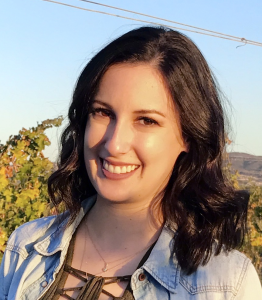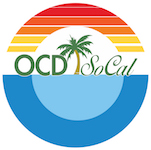 My OCD journey began 14 years ago at the age of 12. All of a sudden, school was “dirty” to me. When I got home, I had to shower immediately and rid myself of the school day. Anything I touched in my house before I showered was contaminated, so I avoided touching things and washed my hands continuously throughout the day. My life was restricted to sitting in one spot on the couch all day so I could avoid touching anything that was “dirty” to me.
My OCD journey began 14 years ago at the age of 12. All of a sudden, school was “dirty” to me. When I got home, I had to shower immediately and rid myself of the school day. Anything I touched in my house before I showered was contaminated, so I avoided touching things and washed my hands continuously throughout the day. My life was restricted to sitting in one spot on the couch all day so I could avoid touching anything that was “dirty” to me.
I would have continued to live my life like this, with cracked and bleeding hands, but my parents knew something was not right. I started seeing a psychologist soon after, but I hated it. I would hide so I wouldn’t have to go, and I resisted talking to the psychologist or doing any homework assigned to me. My family took to my OCD in different ways. My mom and sister would enable my OCD and agree not to touch things I thought were dirty. My dad, on the other hand, thought he could scare this mental illness out of me. He thought if he acted like a “drill sergeant” and used scare tactics it would go away. It didn’t work. I didn’t understand what was going on with me, but I was comfortable with how my life was going, and I didn’t want to change.
I continued seeing a psychologist until I was 15 and continued to take medication. My OCD seemed to get better as I got older, so when I started college, I stopped taking my medication. I naively thought I was cured and no longer had this thing called OCD. However, it did not go away. My OCD morphed into different forms, and I was completely unaware that it was controlling my life again. When I was 19, I had my first serious boyfriend and my OCD became Relationship OCD. I was constantly afraid my boyfriend was going to break up with me and, when I wasn’t with him, all the “what ifs” would pop into my head. I stopped caring about friendships because I was so hyper-focused on my relationship and making sure I was this “perfect girlfriend.” I soon became anxious and depressed all the time, but I don’t believe I knew these were the symptoms I was feeling. All I knew was when I was with my boyfriend, everything was perfect, but when we were apart, I fell apart. This continued our entire relationship. When we broke up three years later, a part of me was relieved; I knew my days would not be consumed obsessing about him like they had been for the past three years.
Graduating from college and no longer having a boyfriend, it would seem my OCD wouldn’t have anything to latch onto, right? Nope! OCD constantly wants to have control over your life so it will find what already makes you acutely anxious and attach itself to it. I soon found myself completely obsessed with controlling what I ate and how I looked. I restricted what I ate to only “healthy” options, and I created an eating schedule for myself. When I got home from work I worked out for a minimum of 45 minutes every day. I couldn’t enjoy a meal without obsessing over where I could eat that was “healthy,” what I could order, how much of it I could eat, and then when I was done eating, when I could do my compulsion and exercise.
My Relationship OCD also found a way to start attaching itself to my sister. My sister could not leave to hang out with her friends/boyfriend without having a conversation with my OCD. I would get mad and yell at her to try to prevent her from leaving. In my OCD mind, if she stayed home with me it meant she still loved me. But if she went out with her friends, my OCD would take over and convince me that she was eventually not going to love me anymore. It sounds ridiculous saying it out loud now, but in the moment, it was so real. This forced me to constantly ask for reassurance from her that we were ok and that she still loved me. I couldn’t do anything on my own without making sure it was ok with her first. These new thoughts tormented me every day, and it got worse and worse until I finally cracked.
I continued on in this chaotic, anxious and obsessive lifestyle for three years until a traumatic event caused my OCD to completely spiral out of control. After that, it seemed as if every week my OCD came up with new things to torture me with on top of the other things I was already obsessing about. I spent weeks obsessed with the thought that I was pregnant. OCD convinced me that I hated my job and I should do something less stressful. I couldn’t go through a day at work without calling my mom and sister because I was so anxious and I didn’t think I could get through my day. To make things even worse, I started dating someone and my Relationship OCD went completely out of control. I would cry on my way home from work just wanting the thoughts to stop and having no idea how I could stop them. I constantly felt like I was drowning and just barely had my head above water to make it through the day. I was so depressed all the time and I just couldn’t imagine living my life like this anymore. I had to hit my rock bottom to realize this was not how I wanted my life to be.
I started seeing several talk therapists through my insurance, but I quickly realized they were not giving me the right treatment. For example, when I would say I was worried about my sister being mad at me, their response would be to ask for reassurance. I knew that it didn’t matter how many times I asked for reassurance, it wouldn’t stop the thoughts. When I realized that I knew this advice was not right for me and I really looked inside myself, it clicked that OCD had never left me and I had been struggling with it the whole time.
This is when I told my mom I thought my OCD was causing all of my anxiety and depression, and thankfully she found the Gateway Institute. I started seeing Chris Trondsen in October 2015 and by following his steps through ERP, he has helped change my life in so many ways. It is extremely hard to go through treatment because you are constantly being faced with your worst fears. You learn that the way you have been addressing your OCD for so many years is only feeding it and growing it into this crazy monster. However, I knew what my life was like when I completely let OCD have control, and I knew that was not how I wanted to live, or how I could live anymore. This is what kept me pushing through the thoughts and obsessions and really trusting in the process. It is eye-opening when you start realizing how your compulsions only lead you closer to your worst fear and how OCD has been feeding you lies.
Not only did I have to re-train my brain on how to react to my OCD, but my family had to learn the correct way to deal with my mental illness as well. They had to stop giving me reassurance and allow me use my tools to combat the OCD in a correct way. This was extremely hard for them because they only wanted to help me but helping someone with OCD is unlike helping someone with any other illness. OCD treatment is not easy for anyone involved, but I can attest to how much better a life you and your loved ones can live after you have gone through treatment. It has been over a year now since I started seeing Chris, and I still come to Gateway’s Monday night support groups. The support group helps to keep my OCD in check and I am also able to give my advice to other people who are just starting their journey through treatment. It is so important to me and many of the other people that go to our support group to have people who understand you and will be there for you.
Being on the other side is incredible. I have gained so much self-awareness through my recovery and not only about my OCD but about who I am without OCD as well. Before last year I was living my life how someone else wanted me to and not how I wanted to. Living a life where you are just trying to make it through every day by any means possible is not a way anyone should have to live. I also have the mental strength now to deal with life’s daily stressors and not already be exhausted from dealing with OCD. My journey is not over and I know that I have to keep my eye on OCD because it is always lurking around waiting for the perfect time to pounce. However, I have the confidence now to know whatever OCD throws at me, I have the tools to fight it in the correct way and it will never take control of my life again.
I now strive to be an advocate for OCD and to reach out to as many people as I can. My experience with therapists has led me to want to help people identify their OCD. I want people to know OCD comes in many different forms and how important it is to become more aware of the various identities of their OCD. I also want to be able to share my story so that people know they are not alone. It was so important in my recovery to have a community and support system of fellow sufferers and I want other people to have that support too. I hope that my story can help people realize that they don’t have to live their life like this anymore and that there is hope for everyone!
